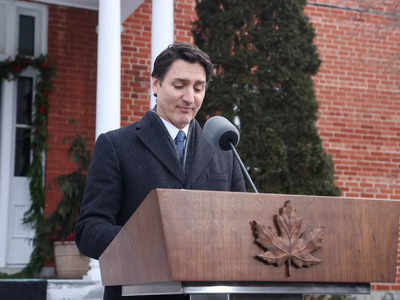- News
- Education News
- News
- Justin Trudeau resigns as Prime Minister: 5 major immigration policy changes under his regime that impacted international students
Trending
Justin Trudeau resigns as Prime Minister: 5 major immigration policy changes under his regime that impacted international students
On January 5, 2025, Canadian Prime Minister Justin Trudeau announced his resignation, marking a shift in political and immigration policies impacting international students, particularly from India. Key changes include reduced study permits, higher financial requirements, stricter work permit regulations, and the suspension of the Student Direct Stream program, all creating uncertainty for Indian students hoping to study in Canada.
On Monday, January 5, 2025, Justin Trudeau, the Liberal Party's poster boy and Canada’s Prime Minister, decided to hang up his political hat and call it quits! While this marks the beginning of a political reshuffle within Canada, it is also expected to influence the country’s international relations, especially with India. During his tenure, Trudeau introduced several significant policies, many of which have directly impacted international students, particularly those from India.
As we take a closer look at these policy shifts, we focus on how some of his decisions have shaped the landscape for Indian students in Canada.
Cap on international students and financial burdens
At the start of 2024, Canada introduced a cap on the number of international students admitted for the year. Although the international student population had exceeded 1 million by December 2023, only 3.60 lakh study permits were approved for 2024—a significant 35% reduction compared to the previous year. The move signaled Canada’s intent to reevaluate its intake policies further, with projections indicating that study permits would decline even more in 2025.
Stricter student visa rules and PGWP eligibility shake-up
In September 2024, thousands of Indian students staged protests against the tightening of work permit regulations in Canada, as per reports. Many feared deportations due to these stricter rules, which imposed limitations on students balancing work and studies. This policy shift left international students, particularly from India, grappling with increased uncertainty about their future in the country.
One major announcement in September 2024 affected the eligibility for Post-Graduation Work Permits (PGWP). Students enrolled in programs delivered by private colleges under licensing agreements with public colleges were declared ineligible for a PGWP. The rapid expansion of these programs, which often lacked oversight, was cited as the reason for the new restrictions.
Further, in September, Trudeau announced via X (formerly Twitter) that the country has decided to reduce student permit visas by 35% in 2024 and implement stricter regulations for foreign workers.
“We’re granting 35% fewer international student permits this year. And next year, that number’s going down by another 10%. Immigration is an advantage for our economy — but when bad actors abuse the system and take advantage of students, we crack down,” reads his post.
Suspension of the Student Direct Stream (SDS)
In November 2024, Immigration, Refugees, and Citizenship Canada (IRCC) suspended the Student Direct Stream (SDS) program, which had expedited visa processing for students from 14 countries, including India. Introduced in 2018, the SDS program enjoyed a 95% approval rate, making it a preferred pathway for Indian students. Its suspension led to longer visa processing times and lower approval rates, disrupting study plans for thousands of Indian applicants.
New study permit rules and extended work hours for international studentsStarting November 8, 2024, international students in Canada were asked to apply for a new study permit to change their post-secondary institution. This policy ensures compliance with the International Student Program (ISP) and applies to changes between institutions, levels of study, or DLIs. Violating these rules could lead to invalidation of permits or deportation. Students must verify their new institution is on the DLI list before transferring. Additionally, the IRCC has increased the off-campus work limit for international students from 20 to 24 hours per week, enabling them to earn more and gain work experience while pursuing education.
Changes to Express Entry Policies
In December 2024, the IRCC announced a significant overhaul of the Express Entry system. Candidates would no longer receive additional points for having a job offer, a measure aimed at curbing fraudulent practices. This change, set to take effect in spring 2025, is expected to impact both new and existing applicants, including international students transitioning from study permits to work permits.
Geopolitical Tensions and Visa Delays and what lies ahead
The political changes, coupled with the evolving immigration policies, are likely to have significant implications for Indian students wishing to study in Canada. With stricter visa regulations, higher financial requirements, and reduced opportunities for work permits and post-graduation pathways, Canada may no longer be the preferred destination for many Indian students. The broader impact of these changes will become clearer as the year progresses, but the shift in policies under Justin Trudeau’s leadership is already evident.
As Canada navigates these transitions, students, especially those from India, will need to explore alternative options for higher education, weighing the benefits and challenges of studying abroad in a changing global landscape.
Stay updated with the latest education news on Times of India. Explore the CBSE date sheet for Class 10 and 12 across Arts, Science, and Commerce streams.
End of Article
FOLLOW US ON SOCIAL MEDIA










